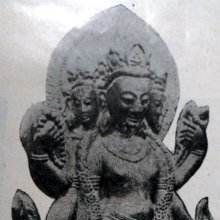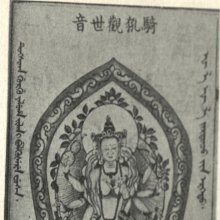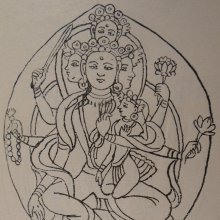Halahala, Halāhala, Hālāhala, Halahalā, Hālahala, Hālāhāla: 23 definitions
Introduction:
Halahala means something in Buddhism, Pali, Hinduism, Sanskrit, Jainism, Prakrit, Marathi, Hindi. If you want to know the exact meaning, history, etymology or English translation of this term then check out the descriptions on this page. Add your comment or reference to a book if you want to contribute to this summary article.
Halahala has 23 English definitions available.
Alternative spellings of this word include Halahal.
Images (photo gallery)
Languages of India and abroad
Sanskrit dictionary
[Deutsch Wörterbuch]
Source: Cologne Digital Sanskrit Dictionaries: Böhtlingk and Roth Grosses Petersburger WörterbuchHalahalā (हलहला):—interj. des Beifalls: śabda [Mahābhārata 1, 2174. 5482. 2, 2298. 5, 7290. 7, 857.] [Rāmāyaṇa 2, 40, 36. 81, 14 (82, 13 Gorresio).] [Rāmāyaṇa Gorresio 2, 13, 27] (halahalā zu lesen). [3, 31, 41. 5, 56, 73.]
--- OR ---
Halāhala (हलाहल):—
1) m. n. ein best. heftiges Gift [Amarakoṣa 1, 2, 1, 10.] [Hemacandra’s Abhidhānacintāmaṇi 1195.] [Medinīkoṣa l. 167.] [Halāyudha 3, 25.] [Spr. (II) 2852.] krodha [?3001. 4677, v. l. Hemacandra Yogaśāstra 3, 28. 32. Pañcatantra 105, 6. Vopadeva’s Grammatik 5, 7.] Vgl. hālahala, hālāhala . —
2) m. eine Eidechsenart [Trikāṇḍaśeṣa 2, 5, 12.] [Hemacandra’s Abhidhānacintāmaṇi 1298.] [Medinīkoṣa] —
3) m. eine Schlangenart (brahmasarpa) [Trikāṇḍaśeṣa 1, 2, 2.] [Medinīkoṣa] —
4) m. Nomen proprium eines Buddha [Trikāṇḍaśeṣa 1, 1, 15. -] [Hemacandra’s Anekārthasaṃgraha 4, 300] heisst es halāhalastu hayabhāle hale viṣe . vṛṣṭyāṃ ca. halāhalā [Rāmāyaṇa Gorresio 2, 13, 27] fehlerhaft für halahalā .
--- OR ---
Hālahala (हालहल):—n. = hālāhala ein best. Gift [Trikāṇḍaśeṣa 1, 2, 4.] [Śabdaratnāvalī im Śabdakalpadruma] [Spr. (II) 2992, v. l.]
--- OR ---
Hālahāla (हालहाल):—n. desgl. [Śabdaratnāvalī im Śabdakalpadruma]
--- OR ---
Hālāhala (हालाहल):—
1) m. a) eine best. Giftpflanze, welche im Himālaya in Kiṣkindhā und am Meere in Koṅkaṇa wachsen soll; ihre Früchte gleichen den Zitzen einer Kuh [Bhāvaprakāśa 5.] — b) eine Eidechsenart [Halāyudha 2, 102.] — c) =
4) [Hemacandra’s Abhidhānacintāmaṇi 1195,] [Scholiast] [Spr. (II) 7388.] —
2) f. ā eine kleine Mausart [Jaṭādhara im Śabdakalpadruma] —
3) f. ī Branntwein [Rājanirghaṇṭa im Śabdakalpadruma] —
4) n. ein best. starkes Gift, das aus den Knollen des Hālāhala bereitet wird; nach [Rāmāyaṇa] und [Bhāgavatapurāṇa] das bei der Quirlung des Oceans gewonnene Gift. [Trikāṇḍaśeṣa 1, 2, 4.] [Rājanirghaṇṭa 6, 224.] [Rāmāyaṇa 1, 45, 21.] [Suśruta 2, 252, 7.] [Spr. (II) 814. 2992. 4677. 5499. 5957. 7124. 7387.] [Hemacandra] [Yogaśāstra 3, 15.] [Bhāgavatapurāṇa 8, 7, 18. 42.] — Vgl. halāhala, hālahala, hālahāla .
Sanskrit, also spelled संस्कृतम् (saṃskṛtam), is an ancient language of India commonly seen as the grandmother of the Indo-European language family (even English!). Closely allied with Prakrit and Pali, Sanskrit is more exhaustive in both grammar and terms and has the most extensive collection of literature in the world, greatly surpassing its sister-languages Greek and Latin.
See also (Relevant definitions)
Partial matches: Hala.
Starts with: Halahala Khalakhala, Halahaladhara, Halahalagana, Halahalaka, Halahalalokeshvara, Halahalana, Halahalane, Halahalanem, Halahalashabda, Halahalatantra, Halahalavisha.
Ends with: Hatahalahala, Kappahalahala, Khalahala.
Full-text (+17): Halahalashabda, Halahaladhara, Hahala, Kalakula, Halahali, Visha, Halahala Khalakhala, Halahal, Akshobhya, Palalaka, Kolahala, Alakali, Arishtakarman, Kutumbakakalaha, Karatalikri, Kutumbakalaha, Halahalatantra, Halahalanem, Kappahalahala, Halahalalokeshvara.
Relevant text
Search found 40 books and stories containing Halahala, Halāhala, Hālāhala, Haḷahaḷa, Haḷahāḷa, Halahāla, Halahalā, Hālahala, Hālahāla, Hālāhalā, Hala-hala, Hāla-hala, Hāla-hāla, Haḷa-haḷa, Hāḷahaḷa, Hāḷāhaḷa, Hālāhāla; (plurals include: Halahalas, Halāhalas, Hālāhalas, Haḷahaḷas, Haḷahāḷas, Halahālas, Halahalās, Hālahalas, Hālahālas, Hālāhalās, halas, hālas, haḷas, Hāḷahaḷas, Hāḷāhaḷas, Hālāhālas). You can also click to the full overview containing English textual excerpts. Below are direct links for the most relevant articles:
Amarakoshodghatana of Kshirasvamin (study) (by A. Yamuna Devi)
Miscellaneous (2): Varieties of poison (Viṣabheda) < [Chapter 3 - Social Aspects]
Sahitya-kaumudi by Baladeva Vidyabhushana (by Gaurapada Dāsa)
Text 10.129 < [Chapter 10 - Ornaments of Meaning]
Text 10.228 < [Chapter 10 - Ornaments of Meaning]
Text 5.10 < [Chapter 5 - Second-rate Poetry]
Guhyagarbha Tantra (with Commentary) (by Gyurme Dorje)
Text 15.10 (Commentary) < [Chapter 15 (Text and Commentary)]
Chapter 15 - Cloud-like Emanation of the Natural Maṇḍala of Wrathful Deities < [Chapter 15 (Text and Commentary)]
Rudra-Shiva concept (Study) (by Maumita Bhattacharjee)
2.11. Rudra as Nīlagrīva or Nīlakaṇṭha < [Chapter 6a - The Epithets of Rudra-Śiva]
2. Rudra-Śiva in the Upaniṣadic Literature < [Chapter 4 - Rudra-Śiva in the Post-Brāhmaṇic Literature]
Historical Elements in the Matsya Purana (by Chaitali Kadia)
Lineages of Vasiṣṭha < [Chapter 6 - Human history in the Matsya-Purāṇa]
The Indian Buddhist Iconography (by Benoytosh Bhattachacharyya)
Related products





